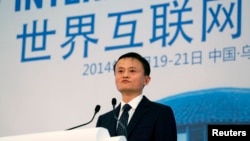Alibaba head Jack Ma said he has resolved a dispute with Chinese authorities over fake goods allegedly sold over the e-commerce website. A Chinese regulatory agency had claimed the majority of items sold through Alibaba were counterfeit. Ma said the whole episode should end up being a positive experience for the company.
Ma’s Alibaba Group is an internet giant, which last year raised $25 billion when it sold shares on the New York Stock exchange in the largest initial public offering in history.
But last week China’s State Administration of Industry and Commerce (SAIC) released a report claiming that the company has not done enough to stop counterfeit and illegal goods from being sold through its website.
Ma said the claim was untrue and expressed frustration over the government’s report.
"We were misunderstood by the world that Taobao is a platform for selling fake products. And we want this company, I have always said, not to represent China's Internet, it represent[s] the spirit of Internet of the whole world," said Ma.
The SAIC said that Alibaba employees took bribes and allowed merchants to market fake wine, handbags and other goods through the site without proper licenses. It also revealed findings of an investigation the agency conducted last fall which found that many of the samples on the Taobao retail site were not licensed products.
The survey included five other Chinese ecommerce sites and of 92 products examined, the survey found 38 to be fake or lacking a way to prove they were authentic.
On January 27, Taobao rejected the survey’s findings in an open letter posted on its account on Sina Weibo. Taobao alleged that the survey was not conducted fairly.
The following day, the SAIC posted a summary of a July meeting between Alibaba executives and SAIC representatives where the SAIC notified Alibaba of fake goods being sold through the site, violations of marketing rules and a faulty consumer rating system.
By the end of last week, tensions between regulators and Alibaba seemed to ease. The SAIC removed the July meeting summary from its website and on Friday said their findings did not have “judicial effect.” Taobao also removed its open letter from its Sino Weibo website.
Western companies have long complained of intellectual property theft and illegal merchandizing by companies in China, and in recent years the government has taken steps to address those concerns.
But Andrew Batson of China research firm Gavekal Dragonomics said it is unclear whether the SAIC’s accusations against Alibaba are related to the crackdown on theft of intellectual property rights.
“In terms of enforcing intellectual property rights and cracking down on pirated goods, China has been pushing in this direction for many years. There has obviously been a lot of pressure from the U.S. and other partners to improve practices here. I think there is some recognition, at least on the part of the central government, that China wants to develop strong industry with intellectual property rights, with software and pharmaceuticals, they need to have stronger protection domestically. So they have been pushing in that direction. I am not really sure that this dispute between the SAIC and Alibaba has anything to do that with that,” said Batson.
Chinese authorities have also been keeping an eye on consumer safety, cracking down on fake goods in the wake of food and drug safety scandals. A revised consumer protection law enacted last March increased compensation for those who buy damaged or fake goods. According to the SAIC, $610 million worth of poor-quality goods were sold in China from 2010 to 2012.
Shaun Rein, author of the book The End of Copy Cat China, doubts China’s crackdown on fake products is related to the current charges against Alibaba.
“I think part of it is consumer protectionism, part of it though might be to sort of pull Alibaba down. I think over the last year Jack Ma might have become too powerful according to some areas. He is taking on vested interests in the financial sector, and retail sales, and entertainment, and some might feel he is getting too powerful,” said Rein.
The SAIC said it waited to release its report on Alibaba until this year so as not to damage the company’s IPO. However, last week, a U.S. law firm announced a class-action lawsuit against Alibaba because it did not disclose its communications with the Chinese regulator before its stock offering.
This week, Jack Ma told an audience in Hong Kong that the company will address the lawsuit with transparency, and that the episode should give western observers a better understanding of Alibaba and China.




